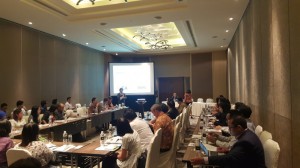

The third TRPC “Going Digital” forum series titled “Powering Indonesia’s Digital Economy” was held in partnership with the local e-commerce association, Assosiasi E-commerce Indonesia (idEA), and took place on Tuesday, 8 Sep, at the Grand on Thamrin ballroom at the Pullman Thamrin Hotel in Jakarta. The half-day forum which took place in the afternoon was well attended, with over 60 participants from the private, public and academic sectors.


The forums in Hanoi and Tokyo focused on the role of mobile/smartphones, and building competitiveness and resilience, respectively. In the case of Indonesia, the focal point was around the growth and development of e-commerce in Indonesia. With the planned government-led e-commerce roadmap in everyone’s minds, the focus on e-commerce came at an opportune time.
The session began with the opening and keynote speech delivered by the Chairman of idEA, and CEO of OLX.co.id, Mr. Daniel Tumiwa. Mr. Daniel Tumiwa highlighted that Indonesia’s e-commerce has piqued the interest from investors and industry giants and was in a prime position to accelerate the growth. While it was one of the biggest e-commerce markets in South East Asia, it still paled in comparison with the markets of the US, the five leading economies of the EU, Japan, and China. China, which has established itself as a world powerhouse in e-commerce, provides a useful model for Indonesia to follow. Indonesia even has the potential to overtake China in terms of its e-commerce growth rate. However the lack of Internet penetration, slow Internet speeds and high costs, restrictive regulations, and a cash-heavy payments market are key barriers that hold back market development. In Mr. Tumiwa’s own words, “although Indonesia may seem like a chaotic market, it is this chaos that is fuelling innovation, and if done right, Indonesia could soon become the next e-commerce super power”.
In line with the government’s intention to release an e-commerce roadmap, idEA has been in discussions with the relevant ministries, and it remains critical to continue engagement with the government to ensure the roadmap stays on track.
Following the keynote, TRPC Director of Research and Consulting Yoonee Jeong proceeded to present the findings of the TRPC white paper, highlighting that while some may not perceive Indonesia as at the stage of applying a digital economy, the transition can actually take the form of different names and shapes. The Asia region is already moving steadily from an “Internet” to a “Digital” economy where the Internet underlies all sectors of the economy. This transition could be wide-reaching and transformational for more developed economies such as d Japan in the form of cloud computing in farming or the use of mobile apps for food delivery services in South Korea’s food delivery market. Turning the attention towards emerging markets, such as Indonesia, e-commerce is becoming the vanguard of the emerging digital economy.
The first panel of discussants featured Ms. Alison Jap, Head of Strategic Partnership, and Mr. Akbar Hadikusomo, Head of DOKU MyShortCart, from DOKU and Mr. Fransiscus Budi from Zalora to share recent developments in the local e-commerce market, as well as lessons learnt from their respective experiences. Mr. Donny Prasetya, EVP and Head of eChannel & Digital Banking unit at PT. Commonwealth Bank and Mr. Bido Budiman from the International Finance Corporation (IFC) also participated as respondents.
The second session, moderated by Mr. Tommy Singgih of idEA and MasterCard featured Dr. Ilham A. Habibie, Head, National ICT Council (DETIKNAS), Mr. Ardi Sutedja K., Founder and Chairman of Indonesia Cyber Security Forum (ICSF), Mr. Yusuf Hasnoputro, Head of KADIN Permanent Committee Division of Application and Content Support, and Ms. Adrianna Tan, Founder and CEO, of Wobe.
A few key messages emerged from this discussion.
- E-payment services engaging SMEs and end users are building trust in digital transactions: According to the panellists, early e-commerce began with consumers selling through social media, platforms and started move on to dedicated online marketplaces such as Tokopedia, Bukalapak and Blanja. Panellists underscored their respective companies’ role in providing alternatives to cash and building confidence among consumers who are fearful of using e-payments, credit cards, and prefer to use cash-on-delivery for e-commerce transactions. In particular, solutions such as DOKU MyShortCart with its easy to use features for consumers and hassle-free on-boarding for merchants, have made it easier for merchants to offer a variety of payment options, and safer for consumers who wish to use such alternative payment methods. Such easy to use tools have helped to develop trust and greater acceptance of e-payments.
- The need to rethink digitization and regulations: Participants from local and international banking organizations shared that their respective organizations had plans to transform to become more digitized and offer secure digital transaction platforms and services. However strategies employed by the Commonwealth Bank had been too focused on the bank’s own perspective, and needed to be tweaked to engage SMEs and the local audience. For example, the bank would assume that people from the rural parts would already be familiar with banking terms, and would want banking products, such as saving accounts, etc, when in reality that was often not the case. IFC shared that while they were trying to help traditional retailers pay and receive electronically, they had to exercise a lot of caution, as any mistake and the retailers would no longer trust the banks.
With the government still playing a catch-up role in terms of regulations for new such as the sharing economy, and e-commerce, the lack of regulations, or “chaos”, as mentioned had led to the development of innovative solutions, such as the example of the app-based motorcycle taxi booking service Gojek. However a lack of regulations also led to an abuse of the service, with too many drivers being hired, thereby putting older drivers under severe competition. From the industry’s perspective, regulation needs to catch-up with innovation, yet needs to be wary not to be overly restrictive, and updated so that it does not become obsolete after a few years . For the government to be able to develop and implement regulations to better protect both consumers and innovators, it needs to continuously engage with the industry and receive their feedback, as the government to better understand what the industry needs.
- The challenges for start-ups going global: The respondent from Blanja spoke about how they benefited from the experience and best practices from its partnership with eBay, and underlined that the single biggest problem for SMEs in going global was many could not speak English. The speaker from Wobe, (the start-up’s name comes from an amalgamation of the words women and benefit), shared that her start-up was focused on empowering women in South East Asia through the use of mobile financial tools, as there remain major gender gaps in Asia, even in the use of digital technologies. Bridging these language and gender inequality gaps would immediately increase the market available for e-commerce.
From the perspective of cyber security, the speaker cited that there were still many misconceptions about cyber security around e-commerce. While e-payment tools were helping to improve security around trust, many users still did not fully understand the risks associated with online activities, or how to navigate these risks. These included concerns over network security, personal identities, encryptions, authorization, host and application security, transaction security, and human error and malice.
- Moving forward and next steps: DETIKNAS mentioned that they had been working with multiple stakeholders from the government, businesses, academics, and NGOs to develop an ICT vision, and meaningful broadband initiative to help the country through four sectors, namely health, education, government services and the economy. Broadband should be usable, affordable, and empowering to support e-commerce within the country. This can only be achieved by accompanying supply-side investments with encouraging demand to use digital services. This could be done with making Internet access more affordable, as well as developing the market for digital services. However the panellists and participants were all in agreement that in order for this to happen, the government can no longer prescribe regulations that it did not fully comprehend. In order for the e-commerce industry to take-off, the government should either “back-off” and allow the industry to regulate itself, or begin to fully consult and take-on board recommendations from the stakeholders involved.
The list of companies that participated is as follows:
- Asia Group Advisors
- Australian Trade Commission
- Bahar & Partners Lawfirm
- Bank BPTN
- Bank Commonwealth
- Blanja
- BPKN (National Consumer Protection Agency)
- DETIKNAS
- DOKU
- Ernst & Young
- Ezytravel
- Faspay
- ICANN APAC
- ICSS
- CIO
- CIO
- idEA
- IFC
- Indosat
- KADIN
- Kemana Services
- LabSatu
- liteBIG
- Melli Darsa & Co
- MVCommerce Indonesia
- Padjadjaran University (UNPAD)
- Spire Research
- com
- TRPC
- US Embassy
- Wobe
- Zalora